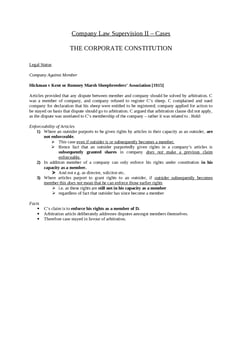Hogg v Cramphorn [1967] Ch 254
Judgement for the case Hogg v Cramphorn
Table Of Contents
KEY POINTS
In corporate governance, directors are guided by fiduciary duties to prioritize the company's best interests. This involves strategic decisions like issuing shares and lending money to maintain control and ensure prosperity. The key criterion is a genuine belief that such actions benefit the company, but this prompts a careful balance to avoid exceeding legal authority.
Scrutiny extends to a company's articles of association, defining directorial parameters. Questions arise when directors consider issuing shares with special voting rights. A provision granting one vote per share during a poll clashes with the potential issuance of shares with disproportionate voting power, like those with 10 votes each.
This complex interplay necessitates legal scrutiny and possible ratification by a general meeting. Aligning directorial actions with the company's broader interests, staying within legal bounds, and protecting shareholder rights contribute to the intricate fabric of corporate governance.
FACTS
Mr. Baxter offered to acquire a significant shareholding in the company, which posed a threat to the existing management.
In response to Mr. Baxter's bid, the directors decided to allot and issue 5,707 shares. There were issues related to the special voting rights attached to these shares.
A trust deed was established as part of a larger scheme to meet the perceived threat from Mr. Baxter's offer. The deed involved issuing shares with special voting rights and interest-free loans to the trustees.
Samuel Rolleston Hogg (‘Plaintiff’) brought legal action, challenging the allotment of shares and the establishment of the trust deed. The plaintiff argued that these actions were improper and breached the directors' fiduciary duties.
The directors maintained that their actions were motivated by a genuine belief that they acted in the company's and its stakeholders' best interests. They sought to prevent Mr. Baxter from gaining control and believed their actions aligned with the Cramphorn Ltd. and Others (‘Defendants’) company's powers.
JUDGEMENT
The court ruled that special voting rights attached to shares (Article 13) must align with Article 75, limiting each share to one vote. Thus, the directors lacked the authority to attach such rights to the 5,707 preference shares. The Plaintiff couldn't set aside the allotment, leaving this action open to the trustees.
The power to issue shares is considered a fiduciary power, which could be set aside if exercised for an improper motive. The belief in the company's best interests didn't exempt it from scrutiny.
The £28,293 loan, part of a scheme to secure control for the directors, wasn't solely for the company's benefit. Issues of shares, the deed, and the loan were deemed ultra vires, requiring company ratification in a general meeting.
The Plaintiff was justified in suing in a representative capacity regarding the loan.
COMMENTARY
In response to Mr. Baxter's bid, the directors strategically issued 5,707 shares with special voting rights and established a trust deed, including interest-free loans to trustees. Samuel Rolleston Hogg, the Plaintiff, alleged these actions breached fiduciary duties. The directors claimed they acted in the company's best interests to thwart Mr. Baxter.
The court ruled that special voting rights must align with specific articles, limiting each share to one vote. The directors lacked the authority to attach such rights to the 5,707 preference shares. The Plaintiff couldn't set aside the allotment under the trustees' jurisdiction.
The court emphasized the fiduciary nature of issuing shares, stating improper motives could render issuances void. The belief in the company's best interests didn't exempt actions from scrutiny.
The loan of £28,293, part of a control-securing scheme, was found not solely for the company's benefit. Issues related to shares, the trust deed, and the loan was considered ultra vires, requiring company ratification in a general meeting.
The Plaintiff was justified in suing in a representative capacity, focusing on the loan and alleged improper fund dispositions. The judgment underscores the court's careful consideration of directors' motives and the need for actions to align with legal principles and the company's best interests.
ORIGINAL ANALYSIS
Directors issued around ~6,000 shares for purpose of defeating a takeover of company; claimed to be doing this in best interests of employees and shareholders of company.
This succeeded, but directors were sued by company for breach of duty.
Held
-
Test for improper purposes is objective
i.e. fact that directors though they were acting in best interests of employees/shareholders is irrelevant
Primary purpose of power to allot shares is raising of capital.
Thus use of power to block a takeover is breach of duty.
For Further Study on Hogg v Cramphorn
Need instant answers? Our AI exam tutor is here to help.
Ask questions 🙋 Get answers 📔 It's simple 👁️👄👁️
Our AI is educated by the highest scoring students across all subjects and schools. Join hundreds of your peers today.
Get StartedSimilar Cases
Related Product Samples
These product samples contain the same concepts we cover in this case.
| Company Law | Directors’ Duties I Notes (25 pages) |

